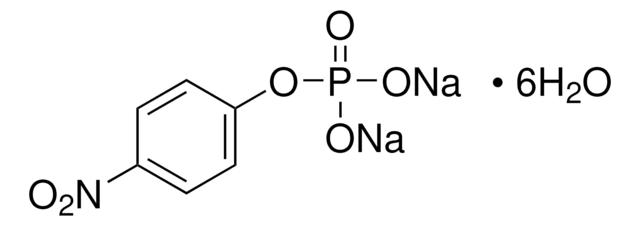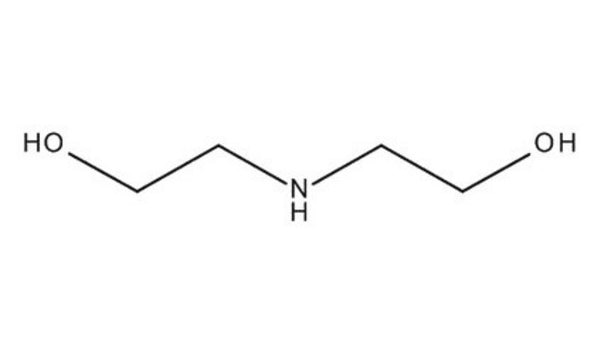31589
Diethanolamine
BioUltra, ≥99.5% (GC)
Synonym(s):
2,2′-Iminodiethanol, Bis(2-hydroxyethyl)amine
About This Item
Recommended Products
vapor density
3.6 (vs air)
Quality Level
vapor pressure
<0.98 atm ( 100 °C)
product line
BioUltra
assay
≥99.5% (GC)
form
liquid
viscous liquid
autoignition temp.
689 °F
expl. lim.
10.6 %
impurities
insoluble matter, passes filter test
≤0.2% water
refractive index
n20/D 1.477 (lit.)
pH
11.0-12.0 (25 °C, 1 M in H2O)
bp
217 °C/150 mmHg (lit.)
mp
28 °C (lit.)
solubility
H2O: 1 M at 20 °C, clear, colorless
density
1.097 g/mL at 25 °C (lit.)
anion traces
carbonate (CO32-): ≤2000 mg/kg
cation traces
Al: ≤1 mg/kg
As: ≤0.1 mg/kg
Ba: ≤1 mg/kg
Bi: ≤1 mg/kg
Ca: ≤5 mg/kg
Cd: ≤1 mg/kg
Co: ≤1 mg/kg
Cr: ≤1 mg/kg
Cu: ≤1 mg/kg
Fe: ≤1 mg/kg
K: ≤20 mg/kg
Li: ≤1 mg/kg
Mg: ≤1 mg/kg
Mn: ≤1 mg/kg
Mo: ≤1 mg/kg
Na: ≤20 mg/kg
Ni: ≤1 mg/kg
Pb: ≤1 mg/kg
Sr: ≤1 mg/kg
Zn: ≤1 mg/kg
λ
1 M in H2O
UV absorption
λ: 260 nm Amax: 0.04
λ: 280 nm Amax: 0.02
SMILES string
OCCNCCO
InChI
1S/C4H11NO2/c6-3-1-5-2-4-7/h5-7H,1-4H2
InChI key
ZBCBWPMODOFKDW-UHFFFAOYSA-N
Looking for similar products? Visit Product Comparison Guide
Related Categories
Other Notes
signalword
Danger
Hazard Classifications
Acute Tox. 4 Oral - Eye Dam. 1 - Repr. 2 - Skin Irrit. 2 - STOT RE 2 Oral
Storage Class
11 - Combustible Solids
wgk_germany
WGK 2
flash_point_f
280.4 °F - closed cup
flash_point_c
138 °C - closed cup
ppe
Eyeshields, Faceshields, Gloves, type ABEK (EN14387) respirator filter
Certificates of Analysis (COA)
Search for Certificates of Analysis (COA) by entering the products Lot/Batch Number. Lot and Batch Numbers can be found on a product’s label following the words ‘Lot’ or ‘Batch’.
Already Own This Product?
Find documentation for the products that you have recently purchased in the Document Library.
Customers Also Viewed
Our team of scientists has experience in all areas of research including Life Science, Material Science, Chemical Synthesis, Chromatography, Analytical and many others.
Contact Technical Service








